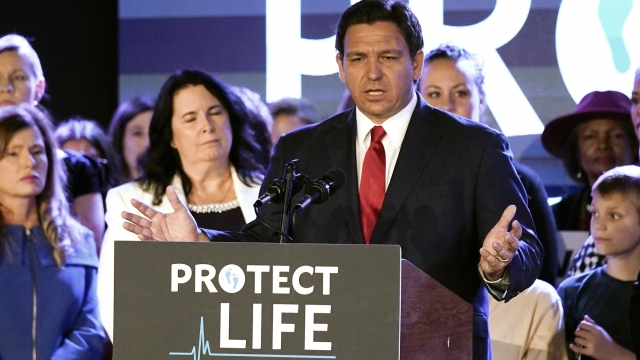Abortion access in Florida may soon all but disappear.
The conservative-leaning state Supreme Court will make a decision on a challenge to a 15-week ban passed last year. If it's upheld, a six-week ban on abortions will quickly take effect. It's already been signed by Gov. Ron DeSantis.
The Republican-led legislature in Tallahassee is sending more money to dozens of crisis pregnancy centers statewide. At least 14 other states provide similar funding.
"Women aren't really going to have that choice to go have the abortion. So we need to let them know that we're here," said Angela Curatalo, who runs the Archdiocese of Miami Respect Life Ministry. She calls crisis pregnancy centers one of the best kept secrets. These centers are not medical facilities and offer limited services. Their mission is to steer pregnant women away from abortion.
Curatalo says the mission is to change the minds of these women. "But not coercively," she argues. "Just by giving them information is power, right?"
They offer free pregnancy tests and an ultrasound. Women also have access to counseling, online parenting classes through toddler age, as well as the basic necessities babies will need.
Curatalo says most women walk in heavily considering abortion, and, by the Catholic organization's own admission, leave feeling the same.
"Last year, we saw and had over 2,000 visits," she said. "And I can tell you last fiscal year, we had 25 babies saved."
That's a success rate of 1.25%. But they believe, as do Republicans in Florida, they're a critical part of the future. Their funding is set to increase nearly three-fold.
SEE MORE: The state of abortion 1 year after Dobbs decision
"We were budgeted last fiscal year at $140,000 to operate and maintain our programs within the ministry," Curatalo said. "And with the new law going into effect, we stand to receive $350,000 to help run our pregnancy help centers."
Statewide, crisis pregnancy centers will receive $25 million in taxpayer funds, up from $4.45 million in 2022.
Oversight is limited. A Reveal News investigation found that Florida doesn't require pregnancy centers that provide medical services to be licensed or inspected.
Curatalo says she needs more funding because she's expecting an influx of women if the new restrictions go into effect.
Jeri Cohen has raised funds to support abortion rights for 35 years. The issue is personal for her. She remembers life before Roe v. Wade. She got pregnant in 1970, just before going off to college, and wanted an abortion.
"It was very terrifying for all of us who got pregnant, and I didn't want to go to have a back-alley abortion. I was scared," she recounts.
Abortion was not legal in Florida, so she flew to New York to have the procedure. Now, generations later, she's sending women money to do the same. Her organization, Women's Emergency Network, has seen a sharp change in the last year.
"Fifteen to 20% of the monies that we've been giving individuals to get abortions have been for travel outside of Florida," she said.
Cohen says she expects that trend to continue, especially if new restrictive laws go into effect here. As a former child abuse court judge, Cohen says she has interacted with some of the young people who, in her mind, will be harmed by Florida's new laws. She says crisis pregnancy centers won't help.
"I did not find that this decision was made casually," Cohen explained. "I think that these are very well thought out decisions that individuals make, because they have to make it for their own well-being."
Curatalo, of the crisis pregnancy center in Miami, disagrees.
"It's not always the right time for them. But look at Mary, Mary was very young when she had Jesus."
Cohen's view on the future in Florida is much more bleak. "You're going to see a lot more teen deaths, because they're going to seek to induce abortion to do it in an unsafe manner."
Trending stories at Scrippsnews.com



